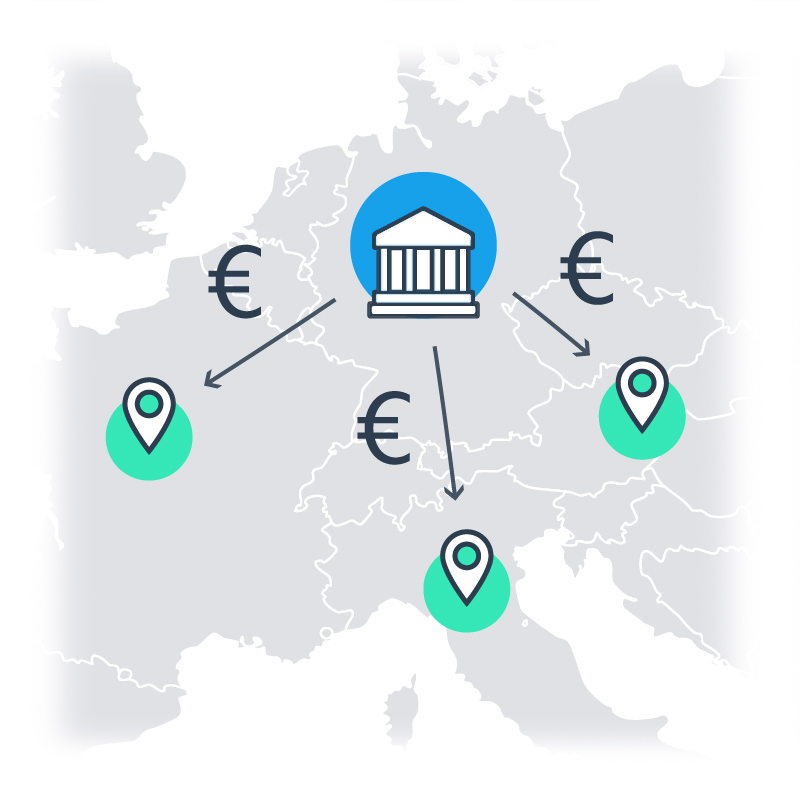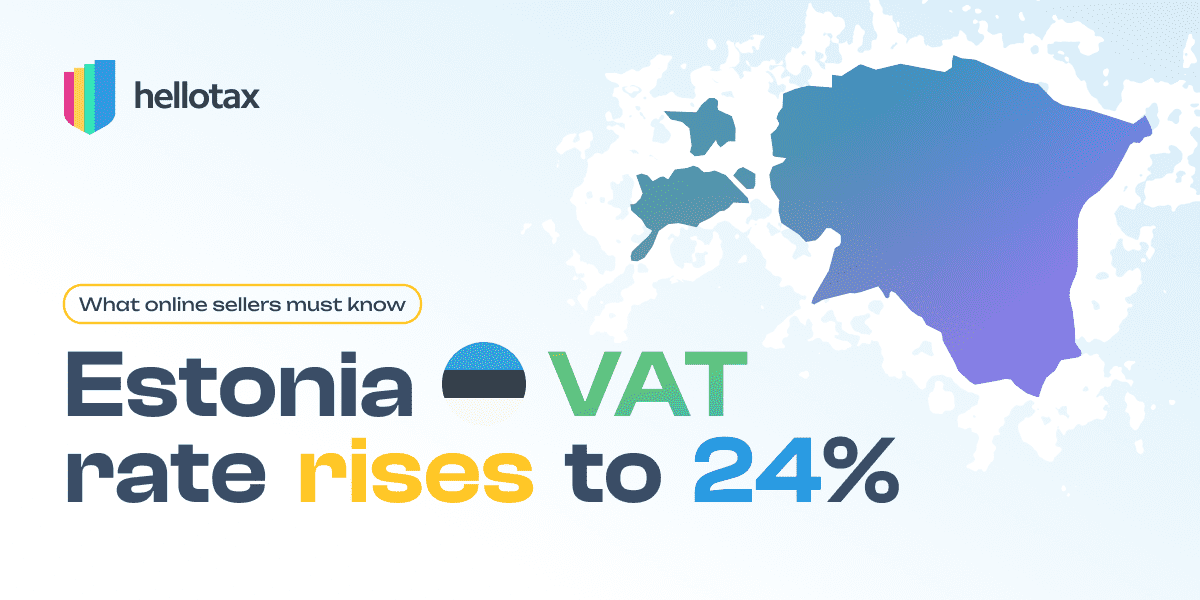OSS – this word raises questions for many online retailers and entrepreneurs in Europe. In the following article we will explain to you how the process works exactly and whether registration is worthwhile for you using a few OSS examples.
Antonia Klatt
Last Updated on 10 June 2022
This is how the One-Stop-Shop works
The One Stop Shop is a general overhaul of the VAT registration and payment system in the European Union on a voluntary basis. On a political level, it serves to avoid tax evasion and, on the other hand, makes it easier for sellers and online traders to meet their VAT obligations.
With a few exceptions, those who register for the OSS process no longer have to register for VAT in all countries in which their buyers are based. Instead, an aggregated One-Stop-Shop report is submitted in the country where the registration for OSS was made, and all VAT is paid there. The authorities then redistribute the correct amounts to the tax offices of the other countries.

Hellotax One-Stop-Shop Solution
- Automated identification of B2C sales
- Automated determination of your tax rates
- Handling of OSS registrations and reports
- Quality control for your transactions
Caution: Nevertheless, each individual sale must be subject to the VAT rate of the respective country. Furthermore, domestic sales must be listed in a separate, regular advance VAT return. The OSS regulations only apply to transactions with buyers in foreign countries within the EU.
Examples of the One Stop Shop, FBA, and delivery thresholds
The OSS regulations are complicated even for experienced online traders and sellers. In the following we will show you using some One-Stop-Shop examples how it works and what changes exist through an OSS registration.
OSS example 1: German company Alpha sells products across the EU
Alpha, a company based in Germany, sells products to buyers in France, Spain, Italy, and the like. All products are stored in Germany and sent directly to buyers in the respective countries. Since Alpha was founded in Germany, it is registered there for VAT purposes. All sales to German customers must be declared in a German VAT return and the tax must be paid to the German tax office.

Register for VAT in Germany

Submit VAT Return in Germany
Information: The delivery threshold regulation states that all sales in other European countries that do not exceed € 10,000 are treated as domestic sales. The domestic VAT rates are used and the sales are reported in the domestic VAT return, and the tax is paid to the domestic tax authorities. You can find more information about the delivery threshold at the end of this article.
If Alpha does not take part in the OSS, the following happens:
- If the sales to non-German European customers are below the new EU-wide delivery threshold of € 10,000, they will be charged with the German VAT rates.
- In this case, only the German VAT registration is required and the entire tax is paid to the German tax office.
- As soon as sales exceed the delivery threshold, Alpha must also register for VAT purposes in France, Spain, Italy, and co.
- Each further transaction across the border, including the 10,001st Euro, must be reported separately in advance and the tax paid individually in each case.
- In addition, these sales must be taxed with the respective country-specific VAT rates.
If Alpha registers in Germany for the One Stop Shop, the situation is different:
- Every transaction in another EU country, including the first, must be taxed on a country-specific basis.
- However, the entire VAT collected in Germany is summarized in the course of an OSS report in Germany and also paid there.
- Sales to German customers are still reported separately.
One-Stop-Shop Example 2: Foreign company Beta sells products through the Netherlands
The American company Beta imports products into the European Union via the Netherlands. There they are initially stored and then sold to customers all over the EU. Beta is already registered for VAT in the Netherlands through the importation, payment of import VAT and storage. Again, sales directly to Dutch customers are handled separately with the Dutch authorities.
If Beta is not registered for the OSS, the same rules apply as for the German company Alpha.
- After exceeding the delivery threshold, Beta has to register for VAT in all countries to which the company delivers to private customers.
- Furthermore, all VAT obligations such as the submission of the advance returns must be done in each country.
But Beta can also use the One-Stop-Shop.
- To do this, the company has to sign-up for the One-Stop-Shop in a European country, ideally the Netherlands.
- Sales to German, Austrian, French and other European customers can now be reported collectively in the country of OSS registration, in this case the Netherlands.
- The Dutch tax authorities then distribute the amounts to the tax offices to which the VAT is due.
One Stop Shop example 3: Polish company Gamma stores in Spain
The Polish company Gamma sells products to private individuals across the EU. Since their products are very popular with buyers in southern Europe and they prefer short delivery times, Gamma operates a warehouse in Spain, from where the products are dispatched to customers in Spain, Italy and France.
Information: Storage in a foreign European country leads to an automatic VAT registration obligation – regardless of whether or not an OSS registration exists. In addition, the delivery threshold regulation may no longer be used. You can find more information on storage at the end of this article.
Should Gamma decide against the OSS, the following points must be observed:
- As usual, Gamma has to register for VAT in every country to which it delivers and submit advance registrations there.
- However, the delivery threshold regulation is no longer applicable as Gamma operates a warehouse outside Poland.
- Therefore, each individual transaction must be carried out with country-specific VAT rates.
Therefore, Gamma is considering OSS registration.
- In this case, the company must register for the One Stop Shop in Poland and register for VAT in Poland and Spain.
- Sales from Poland to Polish customers must be reported in a Polish VAT return, sales from the Spanish warehouse to Spanish customers must be reported in a Spanish VAT return and the respective tax amounts in Poland and Spain must be paid directly.
- Deliveries from Poland or the Spanish warehouse to customers in Italy, France, and co. are declared in the OSS report in Poland and the VAT amounts collected are paid there.

Register for VAT in Spain

Submit VAT Return in Spain
OSS example 4: Gamma stores in Spain and Italy
The Polish company Gamma has grown and now, in addition to the warehouse in Spain, also operates one in Italy. If Gamma still hasn’t registered for the OSS, not much will change. Since private customers in Italy had already been supplied before and therefore an Italian VAT registration and advance returns were necessary, there is no need for action.
However, if Gamma has previously registered for the One-Stop-Shop, there is a need for action.
- In addition to the registrations for VAT in Poland and Spain, there is now also a registration requirement in Italy thanks to the warehouse.
- As in the One Stop Shop example 3 above, from now on deliveries to Italian customers from the Italian warehouse must be reported directly in Italy and sums transferred to the local tax authorities.
- Sales from Italy to Spanish customers and deliveries from Spain or Poland to Italian customers must be reflected in the OSS report in Poland. So must all deliveries from outside Poland to Polish customers be.
One-Stop-Shop example 5: Foreign company Beta also stores in the Czech Republic
The American company Beta from OSS example 2 meets the increasing demand in Europe and operates a warehouse in the Czech Republic. In this case, too, thanks to additional storage in the Czech Republic, the delivery threshold no longer applies. There is still a VAT registration in the Netherlands.
If Beta decides to register for the One Stop Shop now, the administrative tasks will also change here.
- In addition to the Netherlands, Beta must also register for VAT in the Czech Republic.
- In the course of this, all sales from the warehouse to Czech customers must be reported and the tax paid in Czechia.
- All cross-border transactions with private customers, for example from the Netherlands to the Czech Republic, from the Czech Republic to the Netherlands, and from both countries with German, Austrian, French and other European customers are reported in the country of OSS registration, i.e. in the Netherlands .
Is OSS registration worthwhile?
After the basics of the OSS are clear, the question arises for many online retailers whether it is even worth registering for the One Stop Shop. This question cannot always be answered clearly.
One Stop Shop example 6: The French manufacturer Delta
The France-based company Delta makes fine oils. Most of these are sold locally to French customers. However, from time to time some non-French customers from Europe order something via the Delta manufacturer website and the company sends the products directly to the buyers. Whether an OSS registration for Delta is worthwhile depends on the turnover generated abroad via the website.
The following situation exists without OSS registration:
- Up to a turnover of 10,000 € through sales to non-French customers in the EU, Delta can charge the vases with the French tax rate and list the transactions in their regular French VAT return.
- If the VAT rates in the home countries of the buyer are higher than the French, there is even a small competitive advantage for Delta.
- However, if the annual turnover exceeds € 10,000 without OSS registration, Delta must register for VAT purposes in all the countries in which Delta’s foreign customers are based.
With an OSS registration there is no need to act. In this case, all vases sold online must be subject to the country-specific VAT rates. No further VAT registrations are necessary, regardless of how much sales are generated. However, in France OSS reports have to be submitted regularly – an administrative task that Delta could save itself without an OSS registration and with little foreign turnover.
There is a tendency for small companies with mostly domestic buyers to think twice about OSS registration. It is not always worth making use of the regulations.
One-Stop-Shop example 7: The Austrian family company Kappa
The medium-sized company Kappa, a family company based in Austria that manufactures porcelain, sells its products through its online shop. The porcelain is widely known and valued by customers from Austria, but also from a large number of other European countries. After the purchase, it is sent to the buyer directly from the production facility in Austria. Kappa regularly records sales in the high six-digit range and is thus well above the EU-wide delivery threshold.
An OSS registration can be worthwhile for Kappa. Without OSS, the company faces a mountain of administrative tasks.
- Kappa has to register for VAT in all countries in which the customers are based.
- Then there are also regular VAT tasks, such as submitting advance returns, in all of these countries.
The One-Stop-Shop can be advantageous in this situation.
- With OSS registration, Kappa only has to focus on the correct country-specific taxation, which is necessary in every case.
- All transactions are declared in Austria in the course of the OSS report and the VAT is paid there.
- Caution: Sales to Austrian customers are still listed in a separate regular VAT returns in Austria and the tax amount is paid separately
For Kappa, the One-Stop-Shop registration is definitely worth it. Administrative tasks are made easier and no country-specific deadlines have to be observed. This applies as long as Kappa sends the products directly from Austria.
OSS example 8: FBA seller Omega
An FBA seller based in Germany sells its products under the company name Omega on the Amazon online marketplace. Although he is based in Germany and registered for VAT, the majority of his customers come from other European countries.
Omega also participates in a Fulfilled-by-Amazon Program. By participating, the online seller has consented to the storage of his products in Amazon department stores in a large number of countries. Even so, Omega does not always know exactly where its products are.
If Omega decides against the OSS program, the following tasks will be faced by the company:
- Because the products are stored abroad, the delivery threshold is not applicable.
- Every turnover must therefore be taxed on a country-specific basis.
- Furthermore, registration for VAT purposes is necessary in all countries in which its customers are based.
- In all countries, advance VAT returns are due at different deadlines.
- In addition, all VAT amounts are paid separately to the respective tax authorities.
If Omega registers for the One Stop Shop, the administrative tasks may even increase.
- Still, all products sold must be taxed on a country-specific basis.
- However, VAT registration is only required in the countries in which the products are stored. Since FBA redistributes products at short notice, registration is mandatory in all countries included in that FBA program.
- It gets a bit more complicated when reporting sales, as the respective warehouse locations from which products were shipped are decisive.
- Deliveries from a foreign warehouse to customers in the same country are declared separately via the respective advance return and the VAT is paid locally.
- Deliveries from a foreign warehouse to customers in another country, apart from Germany, are declared in the OSS report in Germany and the VAT is paid to the German authorities. These then redistribute the amounts.
- Deliveries from a foreign warehouse to German customers are listed in the regular German advance return and the amounts are paid separately from the One-Stop-Shop payments to the German authorities, as this is a German company.
In the case of Omega and Fulfillment Programs, OSS registration can also cause unnecessary administrative costs. It all depends on how many different countries the customers come from and in how many countries the selected FBA program or the commissioned fulfillment service provider operates warehouses.
Exception to the One-Stop-Shop rules: storage abroad
The most important exception to the basic rules of the OSS is storage abroad. As soon as products are stored in a foreign EU country, they can no longer be dealt with automatically with the OSS regulations.
If the products stored abroad are sent to buyers in this country, these products must be declared in a separate VAT return and the tax paid directly to the local tax authorities. Therefore, VAT registration is still required in warehouse countries. In particular, sellers who use Amazon’s FBA programs or other fulfillment programs with warehouses in various European countries will not necessarily make life easier with OSS.
Alternative to OSS: The delivery threshold
Until the introduction of the One Stop Shop, country-specific delivery thresholds applied in the European Union, usually € 35,000 or € 100,000. If the turnover from sales in the respective country per year was below this threshold, no VAT registration was necessary and no VAT returns had to be submitted. Instead, the transactions could be charged with the home tax rate and listed in the home advance notification.
Since the previous system offered opportunities for arbitrage and the control of the many delivery thresholds was complicated, the country-specific limit values were replaced by an EU-wide delivery threshold for B2C distance sales and electronic services of only € 10,000 net.
If the distance sales turnover in all foreign EU countries is below this threshold value, the domestic tax rates can still be used and the transactions are treated as if they had been made domestically. However, every further sale must be subject to country-specific tax rates, the transactions must be reported there, and the tax liability paid there. Especially in the case of multinationally active online sellers, this often means that several VAT registrations are suddenly necessary in one fell swoop.
Furthermore, the delivery threshold cannot be used if the dealer or the company has storage facilities abroad or has business premises there.
Conclusion: OSS or no OSS?
Whether OSS is worthwhile for your company depends entirely on your business model. The OSS examples discussed in this article show that the One-Stop-Shop is particularly worthwhile for medium-sized companies that ship directly. Small companies or marketplace online sellers should rather exercise caution.
Still not sure how the One Stop Shop works or whether it is worthwhile for your business? We’ll help! Our team consists of local tax advisors and experts who specialize in online trading. Among other things, we can handle your OSS registration, as well as your VAT registrations and the filing of VAT returns in a large number of European countries for you. We are also at your side with all questions. Book a non-binding and free phone call today, learn more about the One Stop Shop and your options, as well as our offers.

Book a free consultation
Our VAT experts are happy to help you. Book a free consultation today!


